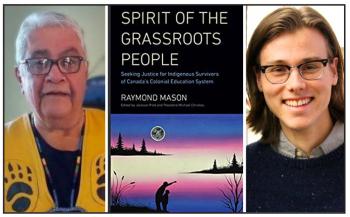Image Caption
Summary
Local Journalism Initiative Reporter
Windspeaker.com
Raymond Mason, an Elder from Peguis First Nation, Man., has a story to tell and it’s one that is garnering international attention.
Last October, Mason’s book Spirit of the Grassroots People: Seeking Justice for Indigenous Survivors of Canada’s Colonial Education System was published by McGill-Queen’s University Press.
The book is a chronology of Mason’s life. It includes his painful experiences in both Indian residential school and Indian day school. It outlines his triumph in creating Spirit Wind, which spearheaded the two movements that led to survivors of residential schools and day schools being recognized and receiving financial compensation.
However, more importantly for Mason, Spirit of the Grassroots People is about giving credit to Spirit Wind, an organization that hasn’t been given its dues, he says.
The book is about telling the truth, he says.
“I write and speak my life without prejudice because my memory may play some tricks on me. I may say some things or describe events in a manner that is not liked or accepted universally, but these words represent the truth to the best of my knowledge. I tell this story truthfully,” he writes in his introduction.
In an interview with Windspeaker.com, Mason says it has been painful to read articles about the work being undertaken for the Legacy Fund and other aspects of the McLean Day School Settlement Agreement between the federal government and survivors of specified Indian day schools and not see his name attached to the history of that fight.
“Not to acknowledge the founder, the whole work horse. I’m the pillar behind the whole process, and to treat me like this is not fair. It’s devastating to say the least,” he said.
Mason claims that his role and that of Spirit Wind fell to the wayside because of legal strategies and being “snubbed by various officials.” He outlines how this happened in his book.
This lack of acknowledgement, the fact that Mason had already started to pen his story, and a phone conversation with Queen’s University PhD candidate Jackson Pind led to Spirit of the Grassroots People.
The book has a unique approach; what Mason refers to as “two-eyed seeing and storytelling.” Pioneered by Mi’kmaq Elder Albert Marshall, it’s a technique that intertwines Indigenous storytelling with Western notes and context.
The method keeps Mason’s story at the centre of the book, says Pind, but allows for documents and footnoted references to present the historical context.
“We’re trying to bring both perspectives, both Raymond’s perspective and then the perspective that we knew was in the archives, and Ray didn’t have a really wide understanding of because he didn’t really remember all that information on his life and (he was) not even aware of the files that are out there. That was kind of our job, to bring it together,” said Pind.
“I think the most important part is that it speaks to two different types of groups right now … We were trying to speak to both Canadians broadly, but also Indigenous people could also see themselves reflected in it with their oral history,” he added.
Pind, who is Anishinaabe and settler, says he often uses this approach in his own work.
“I’m trying to blend Indigenous oral histories with kind of the archival history that’s traditionally used,” he said.
Pind and Theodore Michael Christou, professor, social studies and history education at Queen’s, edited Mason’s book.
Pind says Mason asked them to publish the book in the “best place.” Pind and Christou felt that would be with McGill-Queen’s University Press, which also published the reports from the Truth and Reconciliation Commission on Indian residential schools. To accomplish that goal, Mason’s book needed to “show the historical side and not just the oral history side.”
The appendices, says Pind, contain “powerful” documentation. Among those is the 2017 apology letter Mason received from the Anglican Church of Canada, as well as Mason’s 2008 independent assessment process report.
“Those types of documents, I think, are going to be proof in the future that this happened: Here’s the evidence of it and its undeniable. And I think that type of stuff is really useful. Even now people deny the holocaust. I think having that kind of physical proof is really important for people to understand,” said Pind.
Mason believes the mixture of these two approaches in telling his story has strengthened it.
In fact, he says, he’s had requests to have his book translated into Chinese and German.
Thanks to the international reach of the McGill-Queen’s University Press, Spirit of the Grassroots People is available around the world.
“What it talks about, particularly about Canada and Canada’s history, particularly about the afterword where we get to the nitty gritty talking about where Canada has changed or not changed since the 1960s, would be interesting for a lot of people,” said Pind.
Mason’s book can be purchased on Amazon.
Local Journalism Initiative Reporters are supported by a financial contribution made by the Government of Canada.

